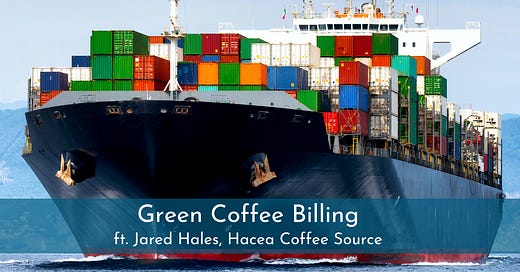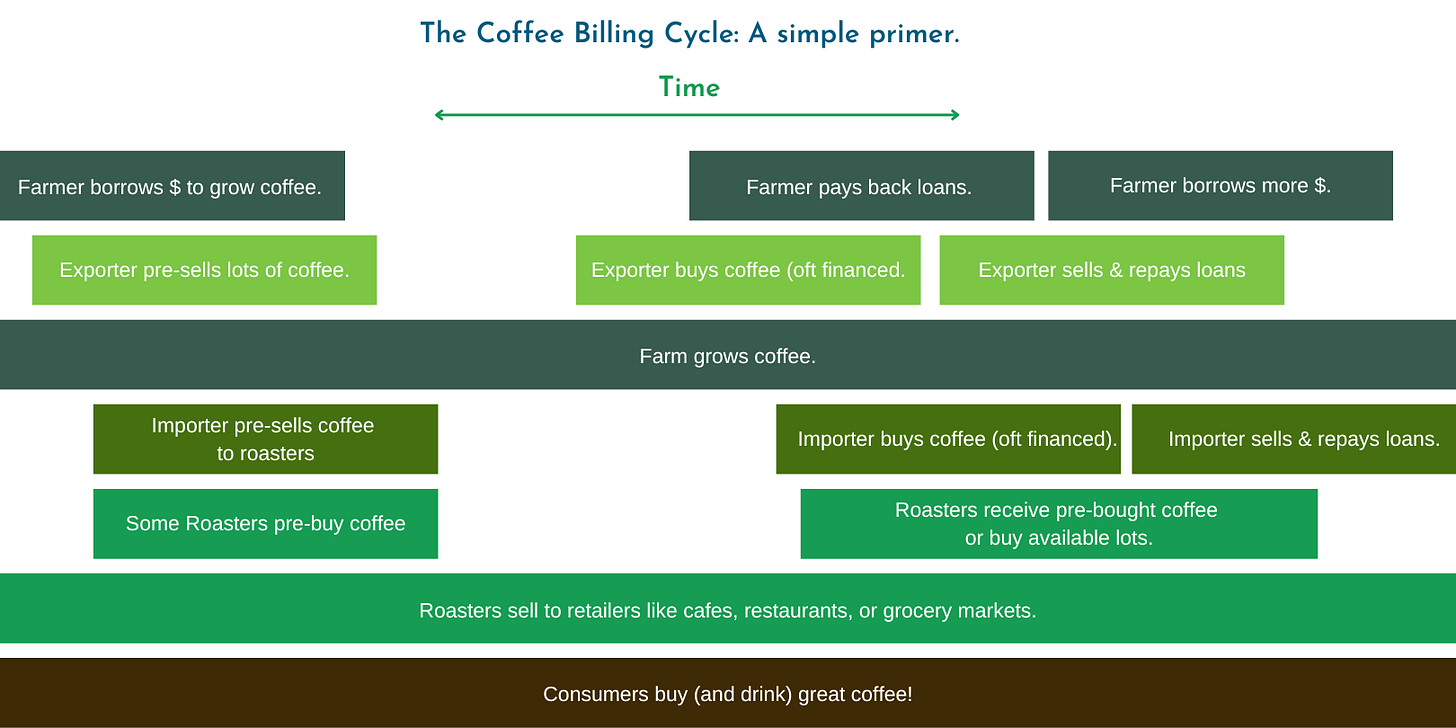Topic: Green Coffee Billing Cycle
Coffee Smarter Expert: Jared Hales, Hacea Coffee Source
Connect: www.haceacoffee.com • @haceacoffeesource on Instagram

We’ve established that there are a lot of players involved in the creation of a cup of coffee. I’m drinking a cup of Steady State Roasting’s Space Traveler I brewed this morning. The bean originated in Ethiopia and Guatemala. The process of growing, processing, and transporting occurred twice on differing continents so that I could enjoy a fruit-forward cup of coffee on a third.
Trying to explain the logistics that occur to enable me (and you) to drink great coffee feels a bit like attempting to explain Christopher Nolan’s Interstellar* or Tenet films. There are so many overlapping threads of time and money that it is easy to get lost in a tangled mess.
But it all comes down to money, doesn’t it? In the new podcast, Jared and I attempt to make sense of where the money is going and when.

KEY TAKEAWAYS
This focus is on the basics. There are often more businesses in the middle that touch the coffee and are part of the billing process. For example, transportation is often a cost factor between the farm and processing/washing station and/or from the their to the port of exit. Then again, after delivery to a destination harbor, green coffee needs to be transported to a storage facility. For our purposes, we focused on the significant players who assume the most cost and risk.
The Float: At each stage of the coffee transaction there is likely at least one of the businesses operating on the the float. This means they are using monies they don’t have (credit) or have borrowed to float the business along until they get paid by the other side of the transaction.
The Farm/Processing Station: The coffee supply has a unique billing cycle that is tied to the harvest cycle.
Farmers pick cherries from the plants one time per year, which is not tied to when the coffee is being consumed. We drink coffee year-round!
When the farm sells their coffee cherry parchment and/or cherries and/or beans, that transaction pays for the entire year of labor and farming needs for either the prior season or upcoming season, depending on where they are in the borrowing monies to fund the operation process.
Interest rates in origin countries are (often) much higher than someone might pay for a business loan in the United States or Western Europe. Rates can balloon to 20 or even 25%.
IMPORTING: Importers need to claim ownership and pay prior to shipment of the coffee. By claiming ownership of the product, an importer like Hacea will be able to procure proper documentation for the coffee to clear U.S. Customs at the border. Yay! They own the coffee, but…
The importer takes on the risk of any issues that happen at sea. This makes shipping consistency and proper storage on-board very valuable to the importer.
Vocabulary term: F.O.B. or Free on Board–meaning the coffee belongs to the importer once it is on the ship.
Products, including coffee, that arrive at the border are subject to random inspections.
A container on a ship has about 300 bags of coffee. The importer is responsible for storing the coffee they’ve paid for. If the average roaster orders 10 bags at a time, when that particular 10 bags is shipped, they will receive an invoice for the coffee.
Coffee that arrives to the importer, even if pre-ordered by the roaster, can be rejected. It is a risk for the importer. There are rules to the rejection process, set out by the Green Coffee Association (GCA).
See a sample Green Coffee Contract from the GCA here:
Running a business requires a certain level of trust…but verify.
Getting ahead of the financing offers the most room to save money. Prepaying for your green coffee can reduce expenses significantly.
It is good, really good, to be the bank. The banks get paid when:
The farmers fund their annual operation.
The importer who buy 1000s of pounds of coffee in bulk.
The roasters who are buying the coffee on the float in anticipation of it selling to us, the coffee drinker.
We mentioned education classes at Hacea Coffe Source. I highly recommend them. You can see all the upcoming classes here:
HACEA COFFEE SOURCE ONLINE
Online! Click to shop green coffee on haceacoffee.com
Cup coffee with Jared at Hacea Coffee Source. Hacea regularly offers educational sessions on Tasting, Roasting, and Brewing coffee at their Anaheim, CA cupping studio. Click the button to check out their upcoming classes:
R!WC INDUSTRY PARTNERS
A huge, on-going thank you to this show’s industry partners. Click these links!
Jared Hales of Hacea Coffee Source was featured in ShoutOUT LA. Check it out.
Roastar • Zumbar Coffee & Tea • First Light Coffee Whiskey • Steady State Roasting • Mostra Coffee • Coffee Cycle • Camp Coffee Company • Ignite Coffee Company • Ascend Coffee Roasters • Marea Coffee • Cape Horn Coffee Roasters • Hacea Coffee Source • Crossings Coffee • Acento Coffee Roasters • San Franciscan Coffee Roasters

Do you want to support the show without subscribing? Help keep us caffeinated by buying us a cup of coffee. Thanks for all your support.port.













Share this post